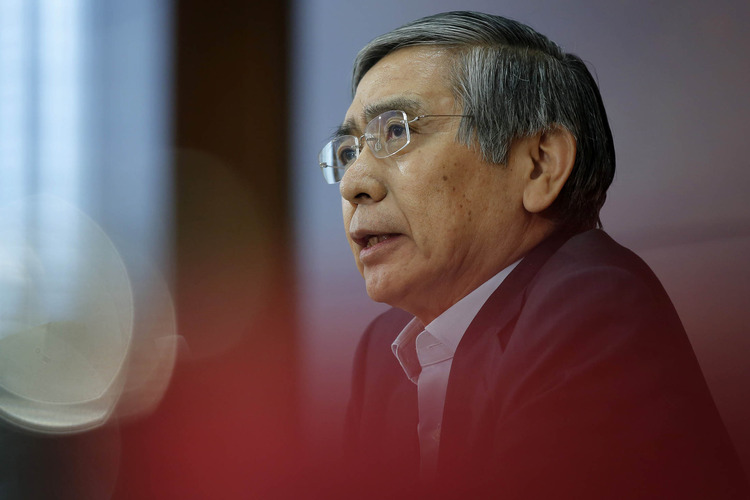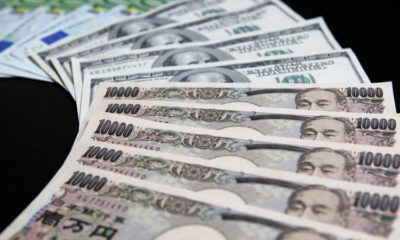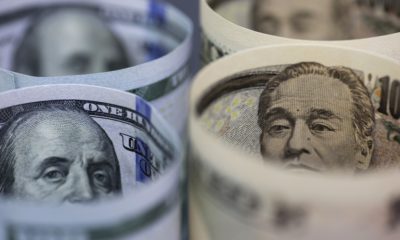The Bank of Japan kept its main monetary stimulus target unchanged Friday while outlining operational changes for its purchases of government bonds, exchange-traded funds and real estate investment trusts.
Friday’s decision to continue expanding the monetary base at an annual pace of 80 trillion yen ($650 billion) was forecast by all but one of 42 economists surveyed by Bloomberg. With analysts almost evenly split on whether the central bank will add to its asset-purchase program next year or stand pat, attention turns to Governor Haruhiko Kuroda’s briefing later this afternoon in Tokyo.
The aim of the changes for JGB maturities, ETF purchases and Japanese real estate investment trusts will be in focus, along with his views on the Federal Reserve’s interest-rate hike, the oil market rout and recent economic indicators. Kuroda said earlier this month that price trends were improving, while repeating he wouldn’t hesitate to adjust monetary policy if needed.
“The BOJ extended the duration of JGBs to show they are not going to taper their stimulus for now,” said Junko Nishioka, chief economist for Japan at Sumitomo Mitsui Banking Corp. in Tokyo. “Now that they adjusted their policy in December, they will wait and see how things will develop.” Nishioka added that she no longer forecasts further easing in January.
The Topic index of stocks jumped as much as 2 percent after the BOJ’s announcement, before falling to trade down 0.6 percent at 1:27 p.m. in Tokyo. The yen fell to 123.56 against the dollar, before recovering to trade 0.4 percent stronger.
Bond Buying Changes
The bank extended the average maturities of Japanese government bonds it buys to seven to 12 years from seven to 10 years currently. This change was opposed by three board members, Takahide Kiuchi, Koji Ishida and Takehiro Sato.
In addition to the annual purchase of 3 trillion yen worth of exchange-traded funds, the bank established a new program to buy 300 billion yen in ETFs. The new program will target companies investing “proactively in physical and human capital” and start from April 2016 with ETFs tracking the JPX-Nikkei Index 400.
These changes passed by a 6-3 vote, opposed by Sato, Ishida and Kiuchi, the only board member to also vote against the main monetary base target.
The bank will increase the maximum amount of real-estate investment trusts it can buy to 10 percent of each issue, from five percent currently.
Data since the last policy meeting in November show that Japan avoided a midyear recession, and people familiar with discussions at the central bank told Bloomberg the economy has been gradually gathering momentum in line with the BOJ’s expectations.
Oil Price Drop
Still, the renewed slide in crude oil and the risk that it could suppress prices in the long term means that BOJ officials are closely watching gauges of inflation expectations, the people said.
The Dubai measure for crude oil is trading around $32 per barrel, compared with the low end of BOJ assumptions for its latest price forecasts of $50 per barrel.
Economy Minister Akira Amari has indicated there is no need for the BOJ to rush to achieve its 2 percent inflation target given the current impact of energy costs, even with the BOJ’s preferred price gauge falling since August.
Fed Policy
The Federal Reserve’s first increase in interest rates since 2006 this week underscores the difference in policy between the two central banks, and the renewed pressure this may bring to bear on the yen to weaken against the dollar.
The Japanese currency has lost about 30 percent of its value against the dollar since Prime Minister Shinzo Abe took office in 2012 with a plan to reflate the economy.
Even so, exports haven’t responded. While the value of shipments overseas has jumped 20 percent since November 2012 to last month, volumes are only 1.1 percent higher.
Both Abe and Kuroda have urged companies to invest more, but there has been little sign of them using their cash reserves, which reached another record last quarter.


 Naira3 weeks ago
Naira3 weeks ago
 News4 weeks ago
News4 weeks ago
 Naira4 weeks ago
Naira4 weeks ago
 Naira3 weeks ago
Naira3 weeks ago
 Jobs3 weeks ago
Jobs3 weeks ago
 Travel3 weeks ago
Travel3 weeks ago
 Naira3 weeks ago
Naira3 weeks ago
 Investment4 weeks ago
Investment4 weeks ago



























